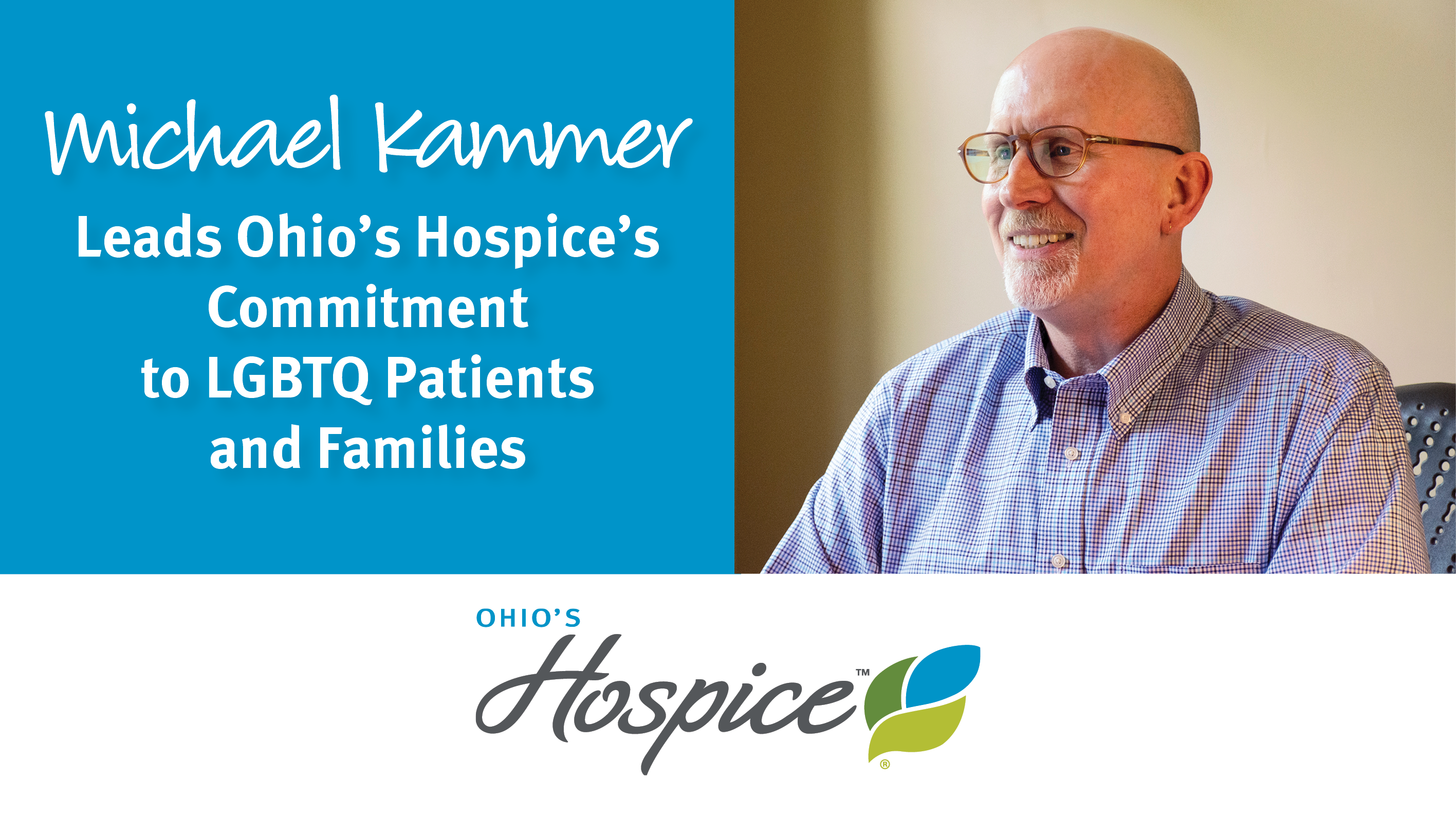
Ohio’s Hospice Is Committed to LGBTQ Inclusive Hospice and Palliative Care
In the spirit of continuous improvement to honor the needs of all the patients and families Ohio’s Hospice has the privilege of serving, the not-for-profit organization is leading an effort to increase awareness of and cultural sensitivity to the unique end-of-life needs of the lesbian, gay, bisexual, transgender, and queer (LGBTQ) community.
Michael Kammer, MDiv, LSW, bereavement counseling professional at Ohio’s Hospice of Dayton, is part of a team that is working to ensure Ohio’s Hospice is well situated to provide inclusive, nonjudgmental and culturally competent care to LGBTQ patients and their loved ones.
Kammer presented a breakout session about LGBTQ inclusive hospice and palliative care at the Miami Valley LGBT Horizons on Aging Summit held in Dayton earlier this year. He also presented a live national webinar on this same topic in June as part of the Optum Lunch and Learn series.
“As a natural extension of the mission of Ohio’s Hospice to provide superior end of life care to people throughout Ohio, we welcome the LGBTQ community,” Kammer said.
With this goal in mind, Ohio’s Hospice of Dayton established a committee to research LGBTQ inclusive hospice care and make recommendations to leadership. As part of its research, the committee worked with Parents and Friends of Lesbians and Gays (PFLAG) and Rainbow Elder Care of Greater Dayton, and read a book specifically on LGBTQ inclusive hospice care. This research resulted in several recommendations to make changes that will reflect our stance as an LGBTQ inclusive and welcoming organization.
These recommendations included adding LGBTQ inclusive language and images to OHI’s nondiscrimination employment and patient care policies, websites and marketing materials, intake and assessment tools, and its electronic medical record system. Providing LGBTQ cultural competency training to staff and leadership at all levels was the primary recommendation made.
Kammer subsequently became part of the training committee which includes representatives from the Education Department, senior leadership and Ohio’s Hospice affiliates. The committee is coordinating LGBTQ competency training for staff and leadership at all levels.
“The goal of the training is to ensure that our care teams and leadership at Ohio’s Hospice have the knowledge base, understanding and tools they need to ensure the LGBTQ community feels welcome, whether they are a patient, spouse, partner, significant other or family member,” Kammer said. “Ohio’s Hospice care teams strive to serve LGBTQ patients and families with dignity and compassion, and we want to be confident and competent in the care we provide.”
Inclusive care begins before Ohio’s Hospice ever serves a patient. “From our policies, websites, marketing materials and new staff member orientation, it’s important that all patients, including LGBTQ individuals, know they are welcome and that staff are culturally competent to meet their care needs,” Kammer said. “LGBTQ inclusiveness continues at the time of admission. The first face they see sets the tone for the rest of their experience.”
During the admission process, staff must respectfully address sexual orientation, gender identity and gender expression. Kammer and the committee have recommended that, in order to be respectful of everyone Ohio’s Hospice serves, all patients should be asked the following questions:
- What name would you like to be called?
- What sex were you assigned at birth? Female, male, intersex, or prefer not to answer?
- What gender do you identify as now? Female, male, transgender male, transgender female, non-binary/gender queer/neither exclusively male nor female, other, or prefer not to answer?
- What personal pronouns do you go by? He/him, she/her, they/them, other___, or prefer not to answer?
- How would you define your sexual orientation? Heterosexual/straight, gay, lesbian, bisexual, other _____, or prefer not to answer?
Kammer advises hospice and palliative care professionals to ask about the patient’s biological and chosen families. Because of the conflict and estrangement that often occurs when a family member comes out, LGBTQ individuals make their own families consisting of chosen friends and others they know they can count on. Staff members need to know who the patient considers to be their family and what role those people will play in their life as they face their end-of-life journey. The care team also asks patients about end-of-life wishes and needs.
“All team members must be aware of the specifics of whom they are serving and gather all the information needed to develop the best plan of care with the patient and family,” Kammer said. “Ultimately, the goal of the plan of care is to ensure the patient’s wishes are carried out until the very end. We want everyone to have the best end-of-life experience possible, so we must make sure that fear of discrimination does not prevent people from being who they are and communicating their wishes at the end of their lives.”
For more information about LGBTQ inclusive hospice and palliative care training and ongoing education at Ohio’s Hospice, contact the Education and Staff Development department at Ohio’s Hospice of Dayton at 937.256.4490.

